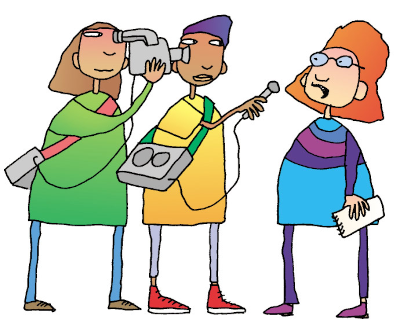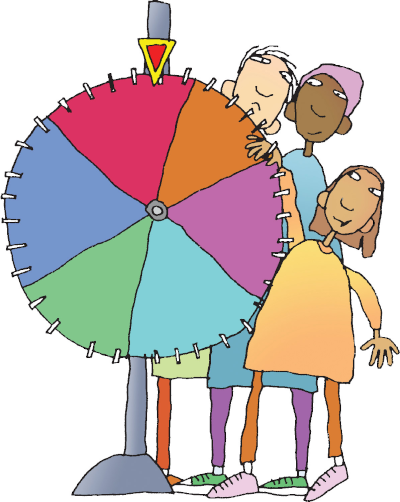Page 413
Working in Groups

When people work together in a group, they can do great things, like cleaning up a local park.
When people in a group work against each other, not much gets done, and the experience is miserable.
Working together happens when group members have the same goal and follow the same plan for making it happen. By listening, cooperating, and clarifying, group members can make strong decisions and get things done.
This chapter will help you work well with others. It all begins with making a plan.
What’s Ahead
WE 414
Page 414
Making a Plan
Every group project should begin with a plan. The members of the group should ask themselves these questions:
- What is our project or assignment?
- What jobs do we need to do to complete it?
- What job or jobs will each group member do?
- What deadlines do we need to meet?
Try using an outline like the one below to help your group make its plan. Make sure all members understand what they need to do.
I. Group Plan
A. Our project is . . .
(Is it to solve a problem, answer questions, research a topic?)
B. Things we need to do:
1.
2.
3.
(Add more lines if you need them.)
C. Jobs for each group member:
1. Name: Job:
2. Name: Job:
3. Name: Job:
(Some sample jobs: writer or recorder, researcher, artist, coordinator)
D. This is our schedule:
1. By this date ( ) we will have this done:
2. By this date ( ) we will have this done:
II. Results
WE 415
Page 415
Skills for Listening
Listening is very important when you work in groups. People can work together only if they listen to one another. Imagine a group of firefighters at a huge fire. If they didn’t listen closely to one another, they could never cooperate well enough to put out the fire and remain safe in the process.
Just listen. 🟪 Listening means thinking about what is being said. So you can’t truly listen and do something else at the same time. Don’t doodle, write notes to your friends, or check your messages while you’re listening.

Listen actively. 🟪 Try hard to keep your mind on what’s being said. It’s natural for your mind to wander from time to time. Because people can’t talk as fast as you can think, your mind can race ahead and get off the track. To stay on track, do the following:
Look at the person who is speaking. This helps you listen because your mind usually thinks about what your eyes see.
Listen for key words and phrases. For example: “The best solution is . . . ” or “Here’s what I think we should do.”
Write down a few notes. Write down some of the main points or details, but keep it short and don’t stop listening.
Ask questions. 🟪 If you don’t understand something, ask about it. But don’t interrupt the person who is speaking unless you’re really lost. Wait until the person is finished. Then ask a good, clear question, such as “Kathy, you’re saying we should do a report instead of making a model, because a report will be easier—right?”
Note Listening is not as easy as it sounds! To hear, you need only your ears. To listen, you need both your ears and your mind.
WE 416
Page 416
Skills for Cooperating
Cooperating means working together with others to solve a problem or reach a shared goal.

Give your ideas and opinions. 🟪 It’s important to let other group members know what you think. When you like someone’s idea, say so! Also say so when you don’t. But don’t say, “That’s a bad idea!” Say, “I don’t think that will work because . . . ” (When you give your opinion, give your reasons, too.)
Be willing to change your opinions. 🟪 Listen to everyone’s opinions with an open mind. Remember that you are trying to reach a decision everyone agrees with.
Don’t get personal. 🟪 Try not to criticize or say anything too personal. And if you hear a personal comment, remind the speaker that this is a group project and everyone needs to work together.
Skills for Clarifying
Clarifying means “clearing up.” If someone in the group is confused, the group can’t work together toward its goal. Here are some ways you can help clear up confusion:
Remember your goal. 🟪 Remind everybody what the group’s goal is, and suggest steps that will help you reach that goal. For example: “First, let’s decide whether to do a report or make a model. Then let’s decide what each person’s job will be.”
Re-explain it. 🟪 If someone doesn’t understand something, re-explain it, or ask if anyone else can think of a new way to explain it.
Stay on track. 🟪 If someone gets off track, say something as simple as, “I think we should get back to the main point.”
WE 417
Page 417
Making a Group Decision
Successful groups make decisions by consensus. Reaching a consensus means “getting the majority of the group to agree with the decision.” How do you get everyone (or nearly everyone) to agree? Here are some tips:
Reaching a Consensus
- Ask everyone in the group for ideas and suggestions. Listen carefully to each person’s ideas.
- Discuss each idea and how it would (or wouldn’t) work.
- Select the idea that most people agree will work well.
- If you select more than one idea, try to combine them into one plan—a plan everyone can agree on.
Tip Remember that to reach a consensus, everyone must be agreeable. This doesn’t mean everyone thinks the decision is the best decision; it means everyone agrees to accept the decision.
Evaluating Your Work
How did your group do? The proof that your group succeeded is a successful product. Before you hand in your project, judge the work your group accomplished. You can do this by having everyone answer and discuss these questions:
- Does our final product meet all the requirements of the assignment?
- Did all the group members do their jobs and contribute to the final product?
- Are we proud to say that this is our product?
Note If you have to answer “no” to any of these questions, you may want to go back and revise your work. Then answer the questions again.
WE 418
Page 418
Sharing Books
One common group project is to talk about a story or novel you have all read. Below you will find some guidelines for discussing fiction.
Before You Begin
Group members should list the ideas they plan to share.
The Plot
What is the most important or exciting event in the story?
What parts of the story remind you of your own life? In what way?
What other stories is this one like?
The Characters
Who are your favorite characters? Why?
How did the main character change during the story?
Overall Effect
Do you think the book has a good ending? How would you have ended the book?
Do you think the title fits the book?
What is the author trying to tell the reader about life?
Who else should read this book?

As You Share
In a small group (no more than six), sit facing each other.
- Look at the person who is speaking.
- Listen carefully to one another and write down your reactions and questions.
- Add to what the others say about the book.
- Make sure you share your personal thoughts about the book, too.
- Stay on track and enjoy the conversation!